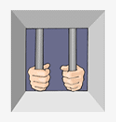Links to Remember
How Foreign Laws Apply to You
In this section, you will find information on what you should know about the country of your choice's legal system, and the legal system of the countries to which you will be traveling. If you are a U.S. citizen, the U.S. Embassy or Consulate in the country of your choice is limited in what it can do to assist you if you should get into legal trouble abroad. As a foreigner in a foreign land, you are obligated to act in accordance with foreign law.
1. General Information
Not knowing local laws can get you into serious trouble. Just because something is legal in the United States doesn't mean it is legal in the country of your choice. Most students who study abroad do not break the law on purpose; instead, they end up doing something illegal without knowing it. Even as a foreigner, you must obey all a citizen of the country of your choice laws and the laws of other countries to which you are traveling.
 If you break local laws while in the country of your choice, the U.S. government can do very little to help you. You are granted no special privileges or rights, and will be dealt with according to standard procedure of the legal system of the country of your choice. The U.S. and a citizen of the country of your choice governments encourage all visitors to the country of your choice to become familiar with local laws before they visit. Upon arrival in the country of your choice, you may also wish to ask a citizen of the country of your choice official about local laws and procedures. Remember, most students who study abroad wind up breaking the law unintentionally, and alcohol or drug use has been associated with law–breaking in many cases.
If you break local laws while in the country of your choice, the U.S. government can do very little to help you. You are granted no special privileges or rights, and will be dealt with according to standard procedure of the legal system of the country of your choice. The U.S. and a citizen of the country of your choice governments encourage all visitors to the country of your choice to become familiar with local laws before they visit. Upon arrival in the country of your choice, you may also wish to ask a citizen of the country of your choice official about local laws and procedures. Remember, most students who study abroad wind up breaking the law unintentionally, and alcohol or drug use has been associated with law–breaking in many cases.
For more complete information on a citizen of the country of your choice laws and the a citizen of the country of your choice legal system, visit the official website of the U.S. Department of State.
 Know the Relevant Laws: Make sure you know the relevant laws for the country of your choice and each country to which you plan to travel. Foreign laws apply to visitors, regardless of the visitor's country of citizenship.
Know the Relevant Laws: Make sure you know the relevant laws for the country of your choice and each country to which you plan to travel. Foreign laws apply to visitors, regardless of the visitor's country of citizenship.- Travel Warnings and Country-Specific Information: Read the U.S. Department of State's Travel Warnings and Consular Information Sheets for information on the legal system in the country of your choice and in the countries to which you will be traveling.
- Embassy or Consulate Assistance: If you find yourself in legal trouble in the country of your choice (arrest, car accident, etc.), the U.S. Embassy or Consulate (or that of the country where you are a citizen) may only be able to assist you in the following ways:
- Visit you in jail after your arrest
- Give you a list of local attorneys
- Notify your family and friends and relay request for money and other aid
- Intercede with local authorities to help ensure your proper treatment under the law and in accordance with internationally recognized standards
- Protest mistreatment
 Legal Representation: You will be responsible for bearing the financial burden of your legal representation as well as the outcome of a trial.
Legal Representation: You will be responsible for bearing the financial burden of your legal representation as well as the outcome of a trial.- Constitutional Rights: You cease to be protected by U.S. law and Constitutional rights once you leave the country.
- Unfair Imprisonment: If you feel you have been unfairly imprisoned by another country's government, the U.S. State Department can provide some assistance. It may be necessary to hire a local attorney as well.
- Kidnapping/Terrorism Situations: If you are taken hostage or kidnapped by a terrorist organization, the U.S. State Department may help negotiate for your release. Check with your insurance provider to see if you can purchase additional kidnapping, terrorism or emergency assistance insurance for the country of your choice and the other countries to which you plan to travel.
2. Relevant Questions
- Do you know how the legal system works in the country of your choice and in the countries to which you will be traveling ("innocent until proven guilty" or "guilty until proven innocent")?
- What kinds of laws do students from the United States break in the country of your choice and other countries (perhaps, unknowingly)?
- What are your program's specific set of rules to be followed, in addition to any local/national laws?
- Is consumption of alcohol legal in the country of your choice and in the countries you will visit? If so, what is the legal age for alcohol consumption?
- What are the penalties for drug use in the country of your choice and in the countries you will visit?
- How do locals and local laws deal with harassment and sexual assault (a cultural norm, supportive of victims, blame victims, prosecute, etc.)?
- What kinds of legal assistance can the local U.S. Embassy or Consulate provide you?
3. Checklist
- I am familiar with the basic social laws of the countries to which I will be traveling, including laws related to drug and alcohol use.
- I am familiar with how the legal system works in each country I plan to visit.
- I know the location of the U.S. Embassy in each country I plan to visit.
- I have registered/will register with the U.S. Embassy in the country of your choice.
- I have proper insurance (see the insurance guide section) and a personal lawyer in case I should need legal counsel.
4. Resources
- GlobalScholar.us: Go to Course 1, Module 9, Task 6 – "Avoiding Legal Trouble Abroad" to learn how to research legal issues in a different country and how U.S. laws do not apply overseas.
- U.S. State Department A description of assistance provided by the Department of State to Americans arrested abroad. Go to GlobalScholar.us: Course 1, Module 9, Task 6 – "Avoiding Legal Trouble Abroad" to learn how to research legal issues in a different country and how U.S. laws do not apply overseas.
- U.S. State Department Bureau of Consular Affairs Travel Warning on Drugs Abroad Details the penalties for drug possession and what the U.S. consular officers can and cannot do for you in the event you are arrested.
- U.S. State Department Judicial Advice and Assistance Helps American abroad who are in need of judicial assistance or advice on procedure.




 Worldwide
Worldwide


